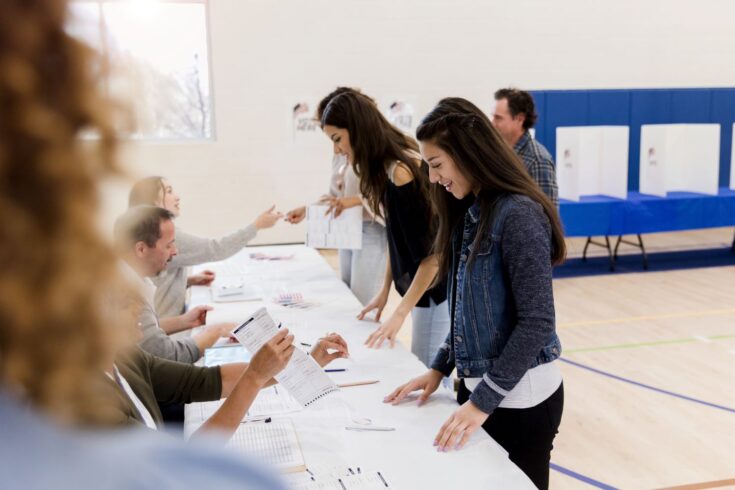The Economic and Social Research Council (ESRC)-supported Electoral Psychology Observatory (EPO), launched in 2022, is led by Professor Michael Bruter and Dr Sarah Harrison. It conducts research on electoral psychology and how it relates to the organisation of elections (known as ‘electoral ergonomics’). Rather than focusing on who wins or loses elections, or on parties and politicians, EPO’s pioneering research aims to understand elections from the point of view of voters.
Dr Sarah Harrison says:
Our work is unique in that we co-design projects which apply unprecedented scientific approaches to understanding voting experiences in elections.
Working with the leading international Electoral Commissions in Australia, the US, South Africa and EU Member States, our research has helped partners better understand voters, their needs, and how to make elections better and more inclusive.
Credit: Economic and Social Research Council
On-screen captions and an autogenerated transcript are available on YouTube.
About the research
EPO introduced the groundbreaking concept of ‘electoral ergonomics’ to electoral practitioners worldwide. Its research shows that every element of electoral organisation, from the design of polling stations to options for casting a vote remotely, will colour voters’ experience, attitudes and behaviour.
Professor Michael Bruter says:
Electoral ergonomics is about taking account of all the ways the election process can impact how, or indeed whether, a person votes. These may be aspects that the voter is simply unaware of.
For example, while most people say they would like the option of voting online, internet voting leaves people feeling less part of a democracy. And hence this would leave people less likely to vote again at the next election.
Voting in person helps young and first-time voters in particular feel happier and more positive about democracy than voting remotely. Crucially, whether a person votes in the first 2 elections of their lives is likely to determine whether they will vote or abstain for the rest of their lives.
Professor Bruter says:
Adhering to best practice in electoral organisation makes voting fairer, more accessible and more fulfilling.
He adds:
What we now know is that your first vote, like other significant ‘first times’ in life, matters and first-time voters need to be treated accordingly.
We also know that it’s vital that first-time voters, minority voters and those with visible or hidden disabilities, such as depression or learning difficulties, feel that the polling station is inclusive of them.
Impacts of the research
EPO’s engagement with electoral stakeholders, including governments, electoral commissions, All-Party Parliamentary Groups, polling agencies, electoral observers, and voters themselves is contributing to better electoral practices around the world.
Optimising electoral organisation
EPO input on all aspects of how voters’ attitudes, turnout and voting choice are affected by how elections are organised has stimulated changes in electoral systems around the world, including:
- ballot paper redesign
- the use and design of voting machines
- polling station design and organisation
Supporting vulnerable voters
Election management bodies in South Africa and Australia have designed initiatives aimed at giving first-time voters and those with learning, cognitive or physical disabilities a better voting experience based on the EPO’s research.
Developing skills and capacities of election administrations
EPO ran training for senior staff of the Central Elections Commission (CEC) in the Palestinian territory, underpinning initiatives to promote inclusion of women and younger voters.
Hisham Kuhail, CEO, CEC of the Palestinian Territories says:
We at the Central Electoral Commission firmly believe that using Professor Bruter and Dr Harrison’s research has contributed to better understanding of the way we serve voters in elections regardless of age, gender or disabilities.
Ultimately this will lead to a better experience and participation of the Palestinian citizens in the coming years.
The research team has also trained CEC staff in Georgia to better understand voters’ needs and worked with Australian officials in polling stations dedicated to accommodating disabled voters.
More accurate polling
EPO research influenced the opinion polling agency Opinium to develop:
- new ways of identifying voters most likely to change their minds
- more precise measures of youth abstention rates
This helped Opinium become the most accurate polling agency at the 2019 UK general election, and 1 of only 2 agencies to predict the EU referendum outcome.
Find out more
Professor Michael Bruter and Dr Sarah Harrison of the Electoral Psychology Observatory (EPO) are finalists in the ESRC Celebrating Impact Prize 2022.
EPO conducts cutting edge research projects on the minds of voters funded by grants from ESRC and the European Research Council.
View the EPO website.
Watch the EPO Demonstrating Impact Youtube video.
Read about the First and Foremost project.
Top image: Credit: SDI Productions, E+ via Getty Images

